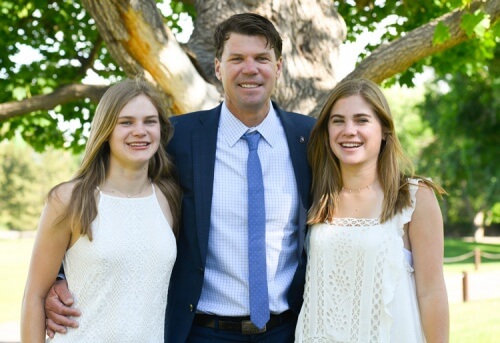Editor’s Note: These are excerpts from Dr. Davis’s message to the Class of 2018 at Graduation.
The great French philosopher of the 16th century, Michel De Montaigne, is well known for his influence on education and learning. De Montaigne’s educational philosophy is one that Colorado Academy tries to emulate in our own unique way. He found that “the most beautiful souls are they that are universal, open, and ready for all things.” Well, here at CA, we have found that you all have beautiful souls—ready to learn and to grow.

Though I have handed out nearly 1,000 diplomas at CA over the past ten years, today is different as there are two very special ladies in this group—my daughters Eliza and Maggi, who are about to graduate. Since we came to CA as a family ten years ago, I have gotten to know so many students and families in the Class of 2018.
Students, I know I speak for all parents when I say how extraordinarily proud we are of your achievements. The reason we are proud is because you are such interesting people who are fun to be around. You have wonderful senses of humor, diverse interests and passions, and you are kind and compassionate people.
‘You can just be’
What do I say to my girls on this important day? Is there anything I can say to all of you that will help you make your lives more meaningful, happier, and more fulfilling?
When I was a kid and young adult, I remember watching the comedian, Gary Shandling. Your generation might know him as the voice of Verne—the turtle with low self-esteem from the animated film Over the Hedge. The actor Gary Shandling, like his character in that film, had a sly, self-deprecating style of humor that was absolutely brilliant.
As a recent Judd Apatow documentary called The Zen Diaries of Gary Shandling makes clear, much of what Shandling wrote in his diaries illustrates his search for meaning in his life. One entry read, “Gary, your strength now is to move on. To live moment to moment. To be happy. And, not to think. That is discipline. It will require strength.” By the end of his life—he died when he was 56—his diaries reflect a person who seemed at peace with where he was in life. He wrote with Zen-like wisdom: “You don’t need to be anything, you can just be.”
‘Share that voice with others’
There are examples of people who achieved that “Zen zone,” that place in which one is so aware of the moment and context and of themselves, unconcerned about the thoughts and judgments of others, that they perform at high levels and at the same time, experience joy and self-understanding.
Think of Liz Phair, an amazing singer-songwriter whose album “Exile in Guyville” changed the landscape for women in rock and roll. It came out 25 years ago, and I remember listening her songs on my CD player. That album was a song-by-song response to the Rolling Stones’ “Exile On Mainstreet,” considered one of the most important rock albums of all time. In her early 20s, Phair wrote her songs from a woman’s perspective—responding to the very male-dominated rock scene of her era with something transformational. She explains that she wanted to take on the subject matter because of its relevance to her life, but also because the Stones’ album was perceived as “untouchable.” In other words, she had the courage and presence to take on something in a bold way.
In a recent interview, the now 50-year-old Phair talked about the legacy of her critical and artistic success. “I’m sort of a feminist spokesmodel for, I guess, putting your voice out there,” she said. “I was the girl next door who just picked up a guitar and went on stage and said what everyone was thinking. I just wanted people who thought I was not worth talking to, to listen to me.”
The more I study history, I find that it is determination and a willingness for a person to find his or her voice and share that voice with others that makes the difference.
We are here on this planet for a short time. We have a duty to love others, to forgive and be forgiven, and to try to be good people. In that process, we might find happiness or a sense of peace but, like Gary Shandling and many other humans have learned, you will figure out at some point that “there is more, and there is also nothing.”
‘You are ready’
I remember one such time—it was when Maggi and Eliza were born in Austin, Texas on March 31, 2000.
I remember every detail of that moment. I remember holding you two—together you only weighed nine pounds. I remember staying all day in the hospital as we enjoyed our beginnings as a family.
There is an exquisite sense of being so present—when all else falls away—a heightened feeling of awareness that defines both the “more” and the “absolute nothingness” when nothing else matters. My advice to all of you is to recognize and embrace that sometimes life just needs to be lived.
Chances are, like me, you won’t remember the advice you got at your high school graduation. That’s ok. I am not worried about any of you. The most important thing to remember is that you are ready.
